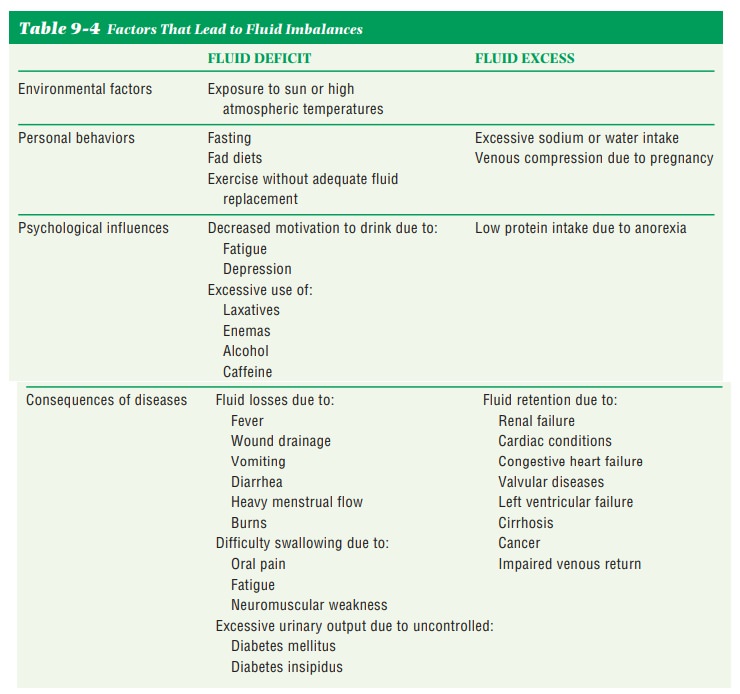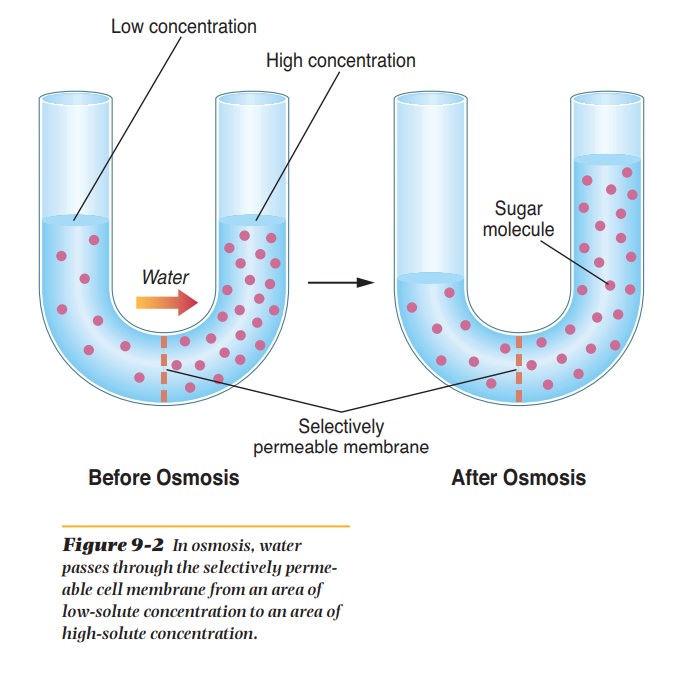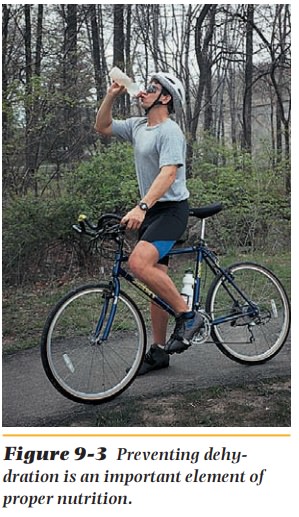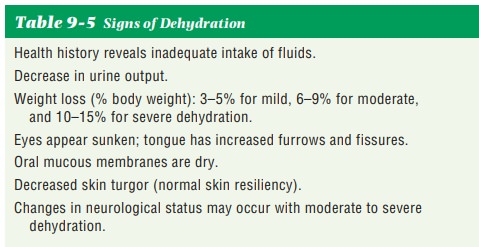Chapter: Nutrition and Diet Therapy: Water
Fluid and Electrolyte Balance
FLUID AND ELECTROLYTE
BALANCE
For optimum health
there must be homeostasis. For this to exist,
the body must be in fluid and electrolyte
balance. This means the water lost by healthy in-dividuals through
urination, feces, perspiration, and the respiratory tract must be replaced in
terms of both volume and electrolyte content. Electrolytes are measured in milliequivalents (mEq/L). An illness
causing vomiting and diar-rhea can result in large losses of water and
electrolytes and must be addressed quickly. Water lost through urine is known
as sensible (noticeable) water loss. Insensible (unnoticed) water loss is in
feces, perspiration, and respiration.
The body must excrete
500 ml of water as urine each day in order to get rid of the waste products of
metabolism (Table 9-4).

Water moves through
cell walls by osmosis (Figure 9-2). Water flows from the side with the lesser
amount of solute to the side with the
greater solute con-centration. The electrolytes sodium, chloride, and potassium
are the solutes that maintain the balance between intracellular and
extracellular fluids. Potassium is the principal electrolyte in intracellular
fluid. Sodium is the principal electrolyte in extracellular fluid. Osmolality is the measure of
particles in a solution.

When the electrolytes
in the extracellular fluid are increased,
ICF moves to the ECF in an attempt to equalize the concentration of
electrolytes on both sides of the membrane. This movement reduces the amount of
water in the cells.
The cells of the hypothalamus (regulates appetite
and thirst) then become dehy-drated, as do those in the
mouth and tongue, and the body experiences thirst.The hypothalamus stimulates
the pituitary gland to excrete ADH (antidiuretic hormone) whenever the
electrolytes become too concentrated in the blood or whenever blood volume or
blood pressure is too low. (This measurement is called vascular osmotic pressure.) The ADH causes the
kidneys to reabsorb water rather than excrete it. At such times, thirst causes
the healthy person to drink fluids, which provide the water and electrolytes
needed by the cells.
When the sodium in the
ECF is reduced, water flows from the ECF into the cells, causing cellular edema. When this occurs, the
adrenal glands secrete aldosterone, which triggers the kidneys to increase the
amount of sodium reabsorbed. When the missing sodium is replaced in the ECF,
the excess water that has been drawn from the ECF into the cells moves back to
the ECF, and the edema is relieved.
The amount of water
used and thus needed each day varies, depending on age, size, activity,
environmental temperature, and physical condition. The average adult water
requirement is 1 ml (milliliter) for every calorie in food consumed. For
example, for every 1,800 kcal in food consumed, one needs to drink 7.5 glasses
of fluid. For optimal health, it is recommended that adults drink at least
thirteen 8-ounce glasses of fluid a day, preferably eight glasses of water but
at least seven of water and five of other fluids. Youth, fever, diarrhea,
unusual perspiration, and hyperthyroidism increase the requirement.
Dehydration
When the amount of
water in the body is inadequate, dehydration can occur. It can be caused by
inadequate intake or abnormal loss. Such loss can occur from severe diarrhea,
vomiting, hemorrhage, burns, diabetes mellitus, exces-sive perspiration,
excessive urination, or the use of certain medications such as diuretics.
Symptoms of dehydration include low blood pressure, thirst, dry skin,fever, and
mental disorientation.
As water is lost,
electrolytes are also lost. Thus, treatment includes replacement of
electrolytes and fluids. Electrolyte content must be checked and corrections
made if necessary. A loss of 10% of body water can cause serious problems.
Blood volume and nutrient absorption are reduced, and kidney function is upset.
A loss of 20% of body water can cause circulatory failure anddeath. Infants,
for example, are at high risk of dehydration when fever, vomit-ing, and
diarrhea occur. Intravenous fluids are often necessary if sufficientfluids
cannot be consumed by mouth.
The thirst sensation
often lags behind the body’s need for water, especiallyin the elderly,
children, athletes, and the ill. Feeling thirsty is not a reliable in-dicator
of when the body needs water. Fluids should be drunk throughout theday to
prevent dehydration (Figure 9-3 and Table 9-5).


Dehydration can occur
in hot weather when one perspires excessivelybut fails to drink sufficient
water to replace the amount lost through perspi-ration. Failure to replace
water lost through perspiration could lead to one of the four stages of heat
illness or could progress through all four. The fourstages of heat illness are:
(1) Heat fatigue, which causes thirst,
feelings of weak-ness, or fatigue. To combat this, one should go to a cool
place, rest, and drinkfluids. (2) Heat
cramp, due to the loss of sodium and potassium, which causesleg cramps and
thirst. One should go to a cool place, rest, and drink fluids.(3) Heat exhaustion, which causes thirst,
dizziness, nausea, headache, and pro-fuse sweating. Treatment includes sponge
baths with cool water, a 2- to 3-dayrest, and the ingestion of a great deal of
water. (4) Heat stroke, which
involvesfever and could produce brain and kidney damage. Emergency medical
service(911) should be called, and the patient should be put in chilled water
and transported to the hospital. People can die from heat stroke. People who
are unableto perspire are at high risk for any of the stages of heat illness.
Excess Water Accumulation
Some conditions cause an excessive accumulation of fluid in the body. This condition is called positive water balance. It occurs when more water is taken in than is used and excreted, and edema results.
Hypothyroidism, congestive heart failure,
hypoproteinemia (low amounts of protein), some infections, some cancers, and
some renal conditions can cause such water retention because sodium is not
being excreted normally. Fluids and sodium may then be restricted. Excess water
drinking is a recognized characteristic of schizo-phrenia. Also it has been
reported that acute psychological stress had led to excessive water drinking
that resulted in brain damage (Mukherjee et al., 2005). Those without a medical
or psychological condition are not prone to excess water intake.